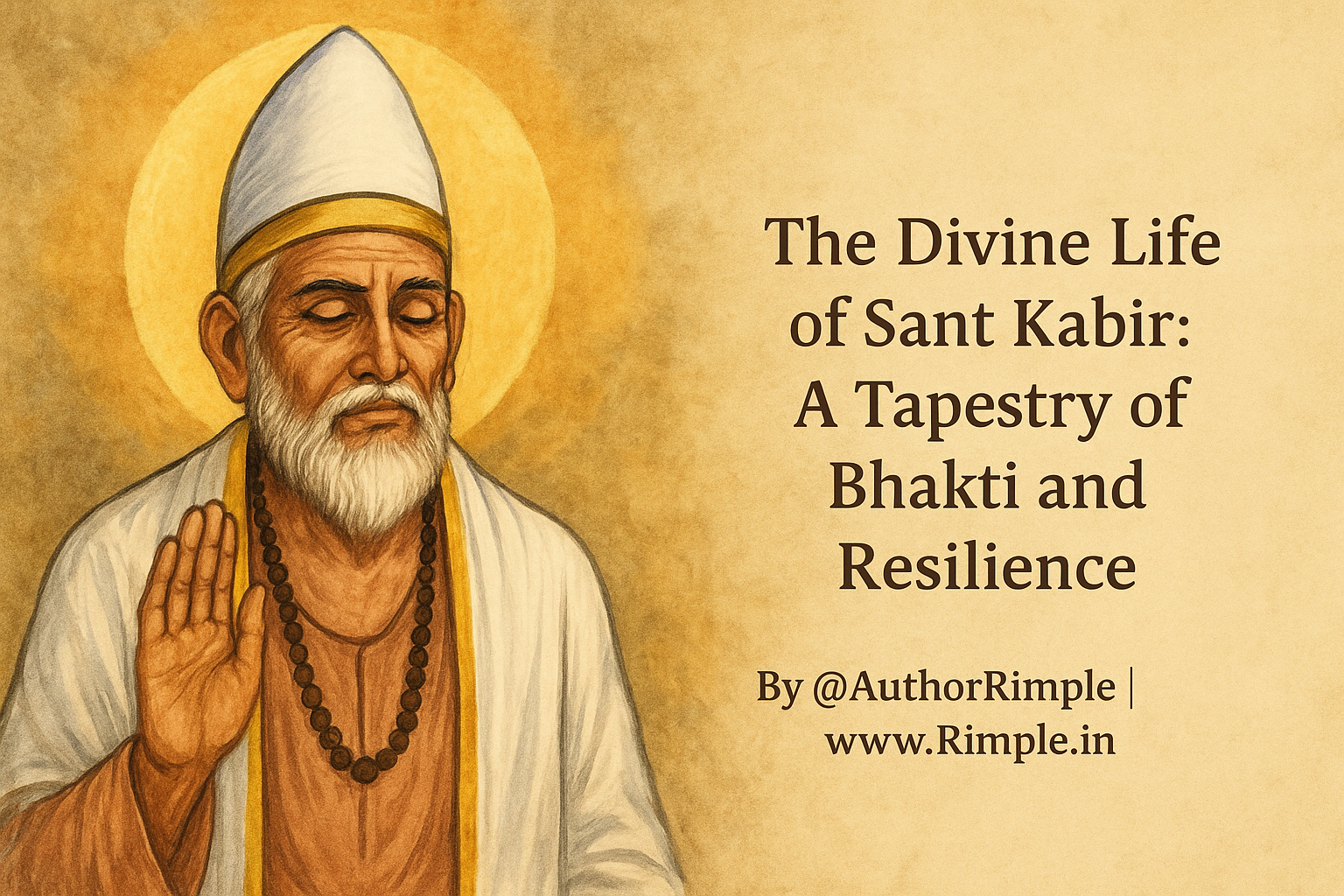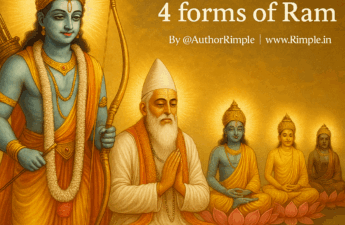Sant Kabir, the mystic poet-saint of 15th-century India, remains a beacon of spiritual wisdom and social harmony. Born in Varanasi around 1398 or 1440, his life was a divine journey along the Bhakti Marg, weaving together the universal truths of Hinduism and Sufism. Raised by a Muslim weaver couple, Niru and Nima, Kabir’s teachings transcended religious boundaries, urging people to find God—whom he called Ram or Hari, —within their hearts. His dohas, simple yet profound couplets, are pearls of wisdom that inspire inner awakening and social reform. This article traces Kabir’s life from birth to death, highlighting his works, his miraculous survival against the wrath of Sikandar Lodi, and the divine doha he spoke about ants during one such threat.
Early Life: A Divine Beginning
Kabir’s birth is shrouded in divine mystery. Found as an infant on a lotus leaf in Lahartara Lake, Varanasi, he was adopted by Niru and Nima, a Muslim weaver couple. Some legends suggest he was born to a Brahmin widow who left him to avoid shame, but regardless, Kabir grew up in a humble home, learning the art of weaving. Varanasi’s spiritual vibrancy, with its Hindu temples and Islamic mosques, shaped his early years.
A Miraculous Incident: As an infant, a Kazi (Islamic judge) declared Kabir a demon and tried to harm him. Miraculously, Kabir remained unharmed and, according to legend, spoke a verse:
Doha in Devanagari:
नाहम जन्म नाहम मृत्यु, नाहम देह न रक्त मांस।
कबीर शब्द स्वरूप हूँ, हरि का संदेश अविनाश।
Poetic Meaning:
I am not born, nor do I die, no flesh or blood am I.
Kabir is the eternal Word, Hari’s message that never dies.
Explanation: This doha reflects Hinduism’s Advaita philosophy, proclaiming the soul’s immortality. Kabir, as the divine Word (Shabda), asserts his eternal connection to God (Hari means Krishna and Vishnu), silencing the Kazi’s fears. It fosters an inner environment of spiritual awakening, emphasizing Bhakti’s truth that the divine resides beyond worldly forms, uniting all in love.
Childhood Wisdom: Though illiterate, young Kabir showed a deep longing for truth, often lost in thoughts of Ram, the formless divine, beyond rituals.
Spiritual Awakening: The Bhakti Marg
Kabir’s quest for truth led him to Swami Ramananda, a Bhakti saint. To gain Ramananda’s acceptance, Kabir lay on the Ganges’ steps, where Ramananda tripped over him and exclaimed, “Rama, Rama!” Kabir took this as his initiation, embracing the Bhakti Marg’s focus on a personal, heartfelt connection with God.
- Ramanujan’s Guidance: Kabir learned to see Ram as the universal divine, not just the son of Dasharatha, but the essence in every heart, aligning with Hindu and Sufi ideals.
- Blending Traditions: His teachings wove together Advaita’s non-dualism and Islamic monism, creating a path of love and equality for all.
His Work: Weaving Poetry and Reform
As a weaver, Kabir crafted cloth, but his true craft was weaving divine wisdom into dohas, songs (padas), and sayings (sakhis), preserved in texts like Bijak, Kabir Granthawali, and the Sikh Guru Granth Sahib. His poetry, in simple Hindi dialects, spoke to the masses, challenging religious hypocrisy, caste, and divisions.
- Key Works:
- Bijak: A collection of poems emphasizing the soul’s unity with God.
- Dohas and Sakhis: Simple verses and sayings that stirred hearts, making Bhakti accessible.
- Songs: Sung in gatherings, they spread love and unity.
Kabir’s words were a call to reform both the inner self and society, fostering an environment of compassion and truth.
Doha on Inner Search
Doha in Devanagari:
ज्योति सरूपी राम है, घट-घट में बस्ता जाय।
कबीर कहे मन खोज ले, बाहर भटके क्यों भाय।
Poetic Meaning:
Ram’s light glows in every heart, in each soul He dwells.
Kabir says, look within your soul, why roam in vain, spellbound?
Explanation: This doha embodies Hinduism’s teaching that God resides within (Antaryami). Kabir urges us to seek Ram inside, not in temples or pilgrimages, reflecting Bhakti’s focus on inner love. Socially, it dissolves caste and creed, fostering equality, as all souls are divine light, creating a harmonious world.
Facing Sikandar Lodi: The Ants’ Doha
Kabir’s fearless critique of religious hypocrisy angered both Hindu priests and Muslim clerics, drawing the wrath of Sikandar Lodi, the Muslim Sultan of Delhi. Lodi, provoked by Kabir’s influence, ordered his execution multiple times, but Kabir survived miraculously, reinforcing his divine protection.
- Drowning: Kabir was thrown into the Ganges, but the waters parted, and he emerged unharmed.
- Burning: Set ablaze, Kabir sat untouched amid flames, his faith shielding him.
- Elephant Attack: Tied to an elephant’s trunk, Kabir remained calm, and the elephant refused to harm him.
During one such threat, when Lodi’s soldiers surrounded him, Kabir spoke a powerful doha comparing human endeavors to ants before the divine:
Doha in Devanagari:
मानव की यात्री चींटी, हरि के आगे जाय।
कबीर कहे सब मिथ्या है, राम बिना बल खाय।
Poetic Meaning:
Human caravans crawl like ants, before Hari’s boundless might.
Kabir says, all is false—without Ram, strength fades from sight.
Explanation: In this doha, Kabir likens human pride and power to ants, insignificant before God’s grandeur. Spoken amidst danger, it reflects Hinduism’s teaching of surrendering ego to the divine, a core Bhakti principle. Kabir’s calm defiance humbled Lodi’s forces, showing that true strength lies in Ram’s name. Socially, it reforms by urging humility, creating an environment where power bows to truth, uniting people under God’s universal love.
These miracles strengthened Kabir’s following, as people saw him as a saint blessed by Hari, beyond worldly harm.
More Dohas Invoking Ram and Hari
Kabir’s dohas invoking “Ram” and “Hari” are divine melodies, guiding souls to Bhakti and unity. Below are additional dohas, each in Devanagari, with poetic translations and explanations.
Doha on Ram’s Name
Doha in Devanagari:
राम नाम की लूट है, लूट सके तो लूट।
कबीर कहे अंत समय, पछतायेगा छूट।
Poetic Meaning:
Ram’s name is treasure free, seize it while you may.
Kabir warns, at life’s end, regret will haunt your way.
Explanation: This doha reflects Hinduism’s belief in the power of God’s name (Naam Japna), a Bhakti practice that liberates the soul. Kabir urges us to chant Ram’s name, a wealth available to all, regardless of caste or creed. It fosters an inner environment of peace and an external one of equality, as chanting unites hearts in divine love, reforming society by dissolving divisions.
Doha on Hari’s Presence
Doha in Devanagari:
हरी बिन कौन सहाय है, कौन करे निहाल।
कबीर कहे मन हरि भज, सदा रहे उजियाल।
Poetic Meaning:
Without Hari, who aids the soul, who brings eternal cheer?
Kabir says, sing His name, let light forever steer.
Explanation: Kabir emphasizes that Hari alone is the soul’s true refuge, echoing the Bhagavad Gita’s call to surrender to God. This Bhakti teaching creates an inner environment of trust, dispelling fear and darkness. Socially, it reforms by encouraging reliance on divine love, fostering a community bound by compassion and unity, where all seek Hari together.
Doha on Ram’s Unity
Doha in Devanagari:
एक राम दशरथ का बेटा, एक राम घट-घट में बैठा।
कबीर कहे राम एक है, मन में राखो नीता।
Poetic Meaning:
One Ram, Dasharatha’s son, another dwells in every heart.
Kabir says, Ram is one, let this truth never depart.
Explanation: This doha, echoing our prior discussions, captures Kabir’s vision of Ram as both the human incarnation and the universal divine, a blend of Saguna and Nirguna Bhakti. It reflects Hinduism’s Upanishadic truth of divine unity, uniting all souls in Ram’s love. Socially, it reforms by dissolving religious divides, creating an environment where Hindus and Muslims see God as one, fostering harmony.
Later Life and Legacy
Kabir lived as a householder in Varanasi, balancing weaving and spiritual teaching. His followers, the Kabir Panthis, revered him as a guru, and his influence touched saints like Guru Nanak and Ravidas. His verses in the Guru Granth Sahib testify to his timeless impact.
- Kabir Panth: A sect spreading Kabir’s message of love and equality.
- Bhakti Movement: Kabir’s ideas fueled the movement, emphasizing inner divinity.
- Enduring Voice: His dohas, sung across India, guide souls to truth.
Death: A Final Miracle
In 1518 (or 1448), Kabir passed away in Maghar. Hindus and Muslims disputed his body, but when the cloth was lifted, only flowers remained, which they shared—Hindus cremating theirs in Varanasi, Muslims burying theirs in Maghar. This miracle symbolized Kabir’s unity message.
- Shrines: A temple in Varanasi and a mausoleum in Maghar honor him.
- Divine Lesson: His death taught that the soul merges with Ram, beyond divisions.
Doha on Life’s Essence
Doha in Devanagari:
राम बुलावा भेजिया, दिया कबीर रोय।
जो सुख साधु संग में, सो बैकुंठ न होय।
Poetic Meaning:
Ram’s call has come, Kabir weeps with tender grace.
The joy of saintly company outshines heaven’s embrace.
Explanation: This doha, said to be Kabir’s last, reflects his Bhakti for Ram and the joy of spiritual companionship, a Hindu ideal of Satsang. It creates an inner environment of love for God and an external one of community, reforming society by valuing divine connection over worldly gains. Kabir’s tears show his human heart, yet his words soar to divine heights.
The Divine Beauty of Kabir
Kabir’s life was a divine loom, weaving Bhakti, truth, and unity. His dohas, invoking Ram and Hari, are hymns of Hinduism’s belief in the soul’s oneness with God, made universal through Sufi love. By surviving Lodi’s threats, speaking of ants before divine might, and challenging caste and creed, Kabir reformed hearts and society. His legacy, a bridge of love, guides us to a divine life where Ram dwells in every heart, uniting all in Bhakti’s eternal embrace.
Also Read:





